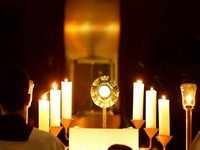 It always disturbs me when people confuse our beautiful liturgy with a communion service, so I find myself, out of necessity, often reflecting on one particular aspect of the two—the preaching.
It always disturbs me when people confuse our beautiful liturgy with a communion service, so I find myself, out of necessity, often reflecting on one particular aspect of the two—the preaching.
What is the difference between a preached homily by a priest during Mass, and a reflection given by a layperson during a communion service, if the reflection is inserted into the place where a homily is usually given? Is the layperson giving a homily? What is going on here?
Understandably, this can be confusing for those who do not understand the difference between a communion service and Mass, or a homily and a personal reflection. But, the difference is significant, and we’re not just talking semantics.
That is why I would like to make some clarification on this frequent cause of concern.
Laypeople are not allowed to preach during Mass. That is reserved for our priests and deacons, as it should be. However, laypeople are allowed to preach in church. But, before we get into that, it must first be said that communion services are not, nor should they ever be interpreted to be, a substitute for the Mass.
Communion services are not a mini-Mass. They do not include all of the elements of the Mass. There is no consecration, because there is no priest present. There is no precious blood. In fact, even some of the gestures, such as how the hands are extended during prayer are different (laypeople do not extend their hands wide, like a priest does.)
And finally, may it be known, far and wide, that if a female layperson is doing a communion service, it does not mean that she is somehow advocating for women priests. Neither is she pretending to be, nor dreaming about, nor imagining that, she is a substitute for the priest!
Anyone with this sort of attitude should not be allowed to lead communion services. Besides, wouldn’t this sort of thinking imply a negation of our own lay vocation, which, in and of itself, is unique and essential to the mission of the Church?
Anyway, it is important to understand that qualified laypeople who do communion services, do it out of a sense of service, rising from their ministry as an Extraordinary Minister, because they are needed. If your priest cannot be present, he wants you to still be able to receive the Body of Christ. Communion services make this possible.
Here’s what Canon Law (#766) says about laypeople and preaching:
"Lay persons can be permitted to preach in a church or oratory, if necessity requires it in certain circumstances or it seems advantageous in particular cases, according to the prescripts of the conference of bishops and without prejudice . . . ."
And here’s what Canon Law (#767) says about the homily in particular:
Among the forms of preaching, the homily, which is part of the liturgy itself and is reserved to a priest or deacon, is preeminent . . . .”
The homily “is part of the liturgy itself.” It is one form of preaching. It cannot be stated any clearer: if no Mass, then no homily. And further, if no priest/deacon, then no homily. Homilies are preached by priests and deacons at Mass. That is never what a layperson is doing when they preach a reflection at a communion service. Why? Because communion services are not the Mass and laypeople are not priests or deacons!
Any qualified layperson who does a communion service, should only be doing so out of respect for the Mass and the priest. To act otherwise would be of great concern.
So, with these two distinctions identified, hopefully we can lay some misconceptions to rest. Maybe now the cloud of confusion will lift, just a little.
Still, I find myself always wondering, Why is this issue such a problem for some people? Is it out of ignorance of the difference between communion services and the Mass, or the difference between a homily and a reflection? Perhaps better catechesis is needed in this regard.
It is my thought that there is one final possibility that the preaching of a reflection by qualified laypeople during a communion service remains disturbing to some people—we love our Eucharistic liturgy and we have an innate desire to protect it. This is very commendable.
Nobody messes with this core sacrament of the Church. And it is out of our shared love of Jesus and his Real Presence in the Eucharist that we want to protect ourselves against a culture gone wild in the name of progress.
Laypeople preaching reflections at communion services is not an example of this, of course, but our fears can lead us to make false presumptions at times. It is good to be diligent for right causes. This just doesn’t happen to be one of them.
Copyright 2013 Janet Cassidy
About the Author

Guest
We welcome guest contributors who graciously volunteer their writing for our readers. Please support our guest writers by visiting their sites, purchasing their work, and leaving comments to thank them for sharing their gifts here on CatholicMom.com. To inquire about serving as a guest contributor, contact editor@CatholicMom.com.


.png?width=1806&height=731&name=CatholicMom_hcfm_logo1_pos_871c_2728c%20(002).png)
Comments